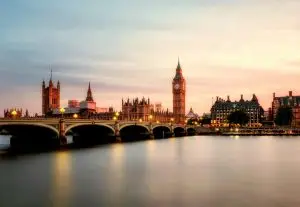The Chancellor faces several challenges in the Budget. On the one hand, Hammond faces downgraded forecasts and worsening public finances. On the other, he must deal with calls for greater public spending.
Hammond is likely to face bad news from the Office of Budget Responsibility (OBR). The OBR has warned that it is likely to ‘revise down productivity growth significantly’ [1] ahead of the Budget. A significant downward revision would reduce the OBR’s forecast for tax receipts and push up projections for government borrowing. Treasury officials have signalled this will create a ‘bloodbath’ in the UK’s public finances. [2] The Institute for Fiscal Studies (IFS) estimates that if the OBR downgraded the UK’s future productivity growth to one per cent, it would push up borrowing by £33 billion in 2020-21. [3] Such a downgrade would limit Hammond’s ability to spend, and could significantly reduce the £26 billion ‘fiscal headroom’ he set aside for the Brexit process.
At the same time, Hammond faces significant pressure from Labour and his own backbenches to increase public spending. Specifically, he is facing calls to abandon the public sector pay cap and halt the rollout of Universal Credit. The Government has announced it will ease the pay cap for police and prison officers. However, there are also calls for this easing to be extended to other public sector workers. Increasing pay in line with inflation for two years would cost £6 billion in 2019-20, according to the Institute for Fiscal Studies (IFS). [4] Meanwhile, Labour and Conservative backbenchers have criticised the rollout of Universal Credit, in particular the six week wait for the first benefits payment. There are also concerns that rising living costs will impact those who are set to face an in-work benefits freeze.
The Government is also being lobbied to woo younger voters. In the last General Election, Labour won more votes than the Conservatives among every age group under the age of 47. [5] Many in the Government are determined to reverse this trend. Action on housing has been identified by the Conservatives as a way to appeal to younger voters. It has been floated in the press that the Treasury is considering a stamp duty cut for first time buyers. [6] This is in addition to previous commitments such as changes to student loans, extra funding to build affordable homes and a manifesto pledge to raise the tax free threshold.
Hammond may struggle to fund this spending and his allies have already warned there is ‘no room for manoeuvre.’ It is unlikely that meaningful tax increases will be on the agenda. With a reduced majority, it is doubtful that the Government will try again with a smaller majority in the Commons. As Thomas Pope, a research economist at the IFS notes, ‘the political arithmetic makes any significant tax increase look very hard to deliver.’[7]
The Chancellor has also been warned not to interfere with pensions. A senior backbencher told The Times that ‘if he goes back to the ideas of the manifesto, of robbing pensions, then he’s in trouble.’ [8] This is a reference to the Conservative manifesto pledge to scrap the pensions Triple Lock in 2020, which costs the Government around £6 billion per year. [9] Further changes to pensions tax relief may not go down well with Tory backbenchers, particularly those with older constituents.
Further spending restraint is an option, Hammond has to tread carefully however. While considered by many a fiscal hawk, Hammond seems of the view that the country is ‘weary’ of austerity after seven years of spending cuts. [10] This is a particularly sensitive issue given that inflation is rising, along with the cost of living, following the depreciation in Sterling since last June. There are also signs that some public services, including prisons [11] and the NHS [12], are finding it difficult to cope with current budget allocations.
The IFS correctly assesses the situation: the Chancellor is ‘between a rock and a hard place’.[13] Balancing strained public finances with the desire for bold, vote-winning new measures will not be easy for the Chancellor.
Photo: Foreign and Commonwealth Office
[1] Financial Times, 10 October 2017, link
[2] Financial Times, 10 October 2017, link
[3] Institute for Fiscal Studies, 30 October 2017, link
[4] Institute for Fiscal Studies, 20 September 2017, link
[5] YouGov, 13 June 2017, link
[6] The Times, 17 October 2017, link
[7] Financial Times, 30 October 2017, link
[8] The Times, 23 October 2017, link
[9] Conservative Manifesto, 18 May 2017, link
[10] Sky News, 4 July 2017, link
[11] Prisons and Probations Ombudsman, 13 July 2017, link
[12] Care Quality Commission, 12 October 2017, link
[13] Institute for Fiscal Studies, 30 October 2017, link




